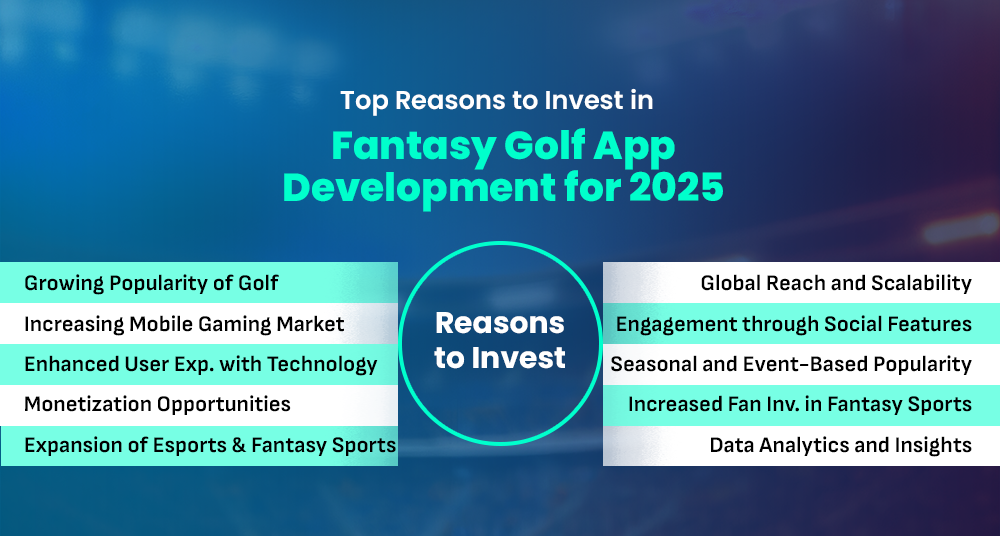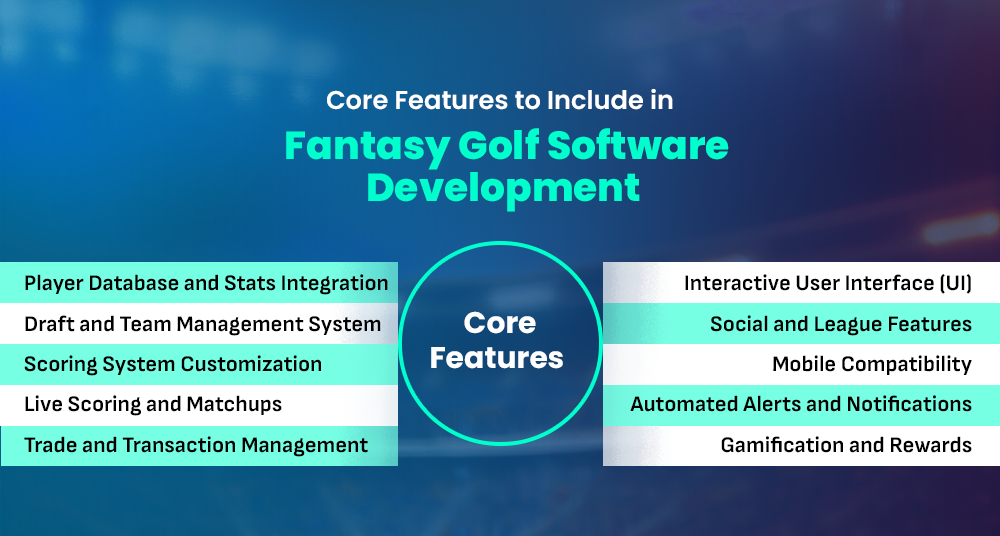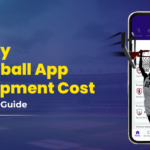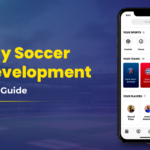As golf’s popularity continues to grow, fantasy sports apps have become an exciting way for fans to engage with the game. Fantasy Golf App Development is a fast-growing niche in the sports tech industry, offering enthusiasts the chance to create their dream teams, participate in virtual tournaments, and win rewards based on real-life player performances. With the 2025 season fast approaching, now is the perfect time to dive into building a white-label fantasy golf app. This guide will walk you through the essential steps, from concept to launch, ensuring your app is both user-friendly and successful in the competitive market.
What is a Fantasy Golf App?
A white-label Fantasy Golf app allows users to create virtual golf teams by selecting real-life golfers and scoring points based on their performances in actual tournaments. Players compete against others in leagues or contests, with points awarded for stats like birdies, eagles, and tournament finishes. These apps offer a fun, interactive way for golf enthusiasts to engage with the sport, track player performances, and strategize their picks for each event, often with the chance to win prizes or bragging rights in the fantasy leagues.
Overview of the Golf Market Size
The global golf market has seen steady growth, driven by increased interest in the sport, the rise of golf tourism, and advancements in technology. It encompasses equipment, apparel, courses, tournaments, and digital platforms. With expanding participation across demographics and regions, the market is projected to continue growing. Innovations in sustainability, virtual golf, and professional tournaments further shape its evolution, presenting new opportunities and challenges.
The golf software market was valued at USD 441.17 billion in 2023 and is expected to grow to USD 934.1 billion by 2030, registering a compound annual growth rate (CAGR) of 13.32% from 2024 to 2030.
Key Reasons to Invest in Fantasy Golf App Development in 2025

Investing in fantasy golf app development in 2025 presents numerous opportunities for growth in the expanding sports and gaming markets. With increasing interest in golf and digital engagement, building a fantasy golf platform offers the potential for high user engagement, innovation, and revenue generation. Here are the top reasons to invest:
Growing Popularity of Golf
Golf’s rising global popularity, fueled by high-profile tournaments and media coverage, creates a solid foundation for fantasy golf apps, ensuring a growing user base and sustained interest in fantasy sports.
Increasing Mobile Gaming Market
With the global mobile gaming market on the rise, fantasy golf apps can leverage mobile-first strategies, providing users with convenient, on-the-go gameplay experiences and real-time updates that enhance engagement.
Enhanced User Experience with Technology
Innovative features like real-time stats, AI-driven predictions, and augmented reality can significantly improve the user experience, providing personalized insights and interactive elements that keep users invested in the app.
Monetization Opportunities
Fantasy sports apps offer diverse revenue streams, including subscription models, in-app purchases, sponsorship deals, and advertising, ensuring developers can generate steady income from a dedicated user base.
Expansion of Esports and Fantasy Sports
As the esports and fantasy sports sectors continue to grow, fantasy golf apps can tap into a highly engaged audience, attracting both sports enthusiasts and gamers seeking new, competitive experiences.
Global Reach and Scalability
Fantasy golf apps have the potential to reach a global audience, catering to golf fans worldwide. Their scalability allows expansion into new markets, offering a substantial return on investment for developers.
Engagement through Social Features
Integrating social features such as leaderboards, friend challenges, and sharing options can boost user engagement, encouraging friendly competition and social interaction, increasing app retention and virality.
Seasonal and Event-Based Popularity
Golf tournaments, like the Masters or PGA Tour events, offer opportunities for special in-app events or promotions, allowing fantasy golf apps to capitalize on seasonal spikes in user interest.
Increased Fan Investment in Fantasy Sports
As more sports fans participate in fantasy sports, investing in a fantasy golf app becomes an attractive opportunity, capturing an audience that is already primed for digital sports engagement.
Data Analytics and Insights
Fantasy golf apps can gather valuable data on user preferences and behavior. This data allows for tailored marketing, app improvements, and better monetization strategies, ensuring long-term success in the competitive market.
How Does Fantasy Golf App Work?
Fantasy golf apps allow users to create virtual teams of professional golfers and compete based on their real-life performance in tournaments. Points are awarded based on a golfer’s performance in events, with users aiming to earn the highest score by selecting players who perform well across various categories.
Creating a Team
Users draft a team of golfers, typically choosing from a pool of players participating in upcoming tournaments. Teams consist of a fixed number of golfers, with a budget to limit selections.
Scoring System
Points are awarded for a golfer’s performance in various categories, such as finishing position, birdies, eagles, and other stats like driving distance or greens in regulation.
Tournament Participation
Fantasy golf teams earn points during real-world golf tournaments, with the app tracking the performance of selected players and updating scores in real-time.
Budget and Salary Cap
In many apps, players are given a salary cap, and each golfer has a value based on their performance potential. Users must stay within the budget while selecting their team.
Competing Against Others
Fantasy golf apps often feature leagues where users can compete against friends or other players. Users’ teams are ranked based on points, and prizes may be awarded for the highest scores.
Live Updates and Strategy
Apps provide real-time updates during tournaments, allowing users to adjust their team strategies based on player performance, weather conditions, and other factors impacting the event.
Prizes and Rewards
Many apps offer cash prizes or other rewards based on performance. Rewards may depend on overall rankings, specific challenges, or achieving milestones throughout the season.
Key Benefits of Fantasy Golf App Development
Fantasy golf app development has gained popularity, offering enthusiasts an engaging and interactive way to participate in golf tournaments. With the growth of digital entertainment, such apps provide numerous benefits. Let’s explore the key advantages of fantasy golf app solutions that enhances user experience and drives business success.
Increased User Engagement
Fantasy golf apps provide real-time interactions with golf tournaments, keeping users engaged throughout events. This dynamic experience enhances fan involvement, as they can track their teams and performances, ensuring continuous engagement. Real-time updates and challenges keep players coming back, fostering long-term user retention.
Gamification and Fun Elements
By integrating gamified features such as leaderboards, achievements, and rewards, fantasy golf apps create an entertaining experience. These elements make users feel like they are actively participating in the game, driving competition and excitement. Gamification adds an element of fun, attracting a broader audience to the app.
Revenue Generation
Fantasy golf apps can generate substantial revenue through in-app purchases, subscriptions, and advertisements. Premium features, such as exclusive content or advanced statistics, can be offered for a fee, while ads targeted to users can bring in additional revenue. The app’s ability to drive financial returns ensures business sustainability
Data Insights and Analytics
With a fantasy golf app, developers can gather valuable data on user behavior and preferences. These insights help enhance the app experience, optimize player features, and tailor future updates. Furthermore, analyzing performance metrics aids in better understanding user engagement and provides data-driven strategies for growth.
Social Connectivity
Fantasy golf apps foster social interaction among players by allowing them to create leagues, chat, and share experiences. By integrating social sharing features, players can invite friends and compete against each other. This strengthens the sense of community, encouraging users to stay connected and active in the game.
Customization Options
A major advantage of fantasy golf app development is the ability to offer users personalized experiences. Users can customize their teams, leagues, and challenges based on personal preferences. This level of customization increases user satisfaction, as individuals can tailor their experience to match their golf knowledge and interests.
Enhanced Brand Loyalty
Fantasy golf apps can build a loyal user base by providing a unique, enjoyable experience. Offering rewards, recognition, and personalized content cultivates strong relationships with players. As users become emotionally invested in the app, their brand loyalty grows, leading to repeat usage and referrals, boosting app success.
Real-Time Fantasy Scoring
Fantasy golf apps provide real-time scoring updates based on live tournament data. This feature keeps users informed of their team’s progress, adding excitement and immediacy to the gaming experience. Real-time scoring enhances engagement and encourages users to follow events closely, making fantasy golf more immersive and interactive.
Key Features to Include in Fantasy Golf Software Development

Fantasy golf software allows users to manage virtual teams, simulate real-life gameplay, and engage with golf statistics. To provide a seamless experience, the software must include several key features that enhance user engagement, strategic decision-making, and real-time interaction.
Player Database and Stats Integration
Comprehensive player data, including real-time statistics, injury reports, and player news, is crucial. Integrating reliable sources ensures users have up-to-date information to make informed decisions when drafting and managing their fantasy teams.
Draft and Team Management System
The fantasy golf app solutions allow users to conduct fantasy drafts efficiently, offering features like auto-pick, rankings, and customizable draft settings. It must also provide tools for roster management, including trades, free-agent acquisitions, and waiver wire functionality.
Scoring System Customization
Flexible scoring system options let users adjust points based on various game events like points, rebounds, assists, steals, and blocks. Custom scoring rules enhance the gaming experience and cater to various fantasy golf formats.
Live Scoring and Matchups
Real-time scoring updates are essential for engaging users during the season. The software should track player performance in real time and update team scores as live games progress, providing instant feedback for owners managing their fantasy lineups.
Trade and Transaction Management
A trade and transaction system should allow users to propose, accept, or reject trades. It should feature an approval process to prevent lopsided trades and include transaction history to track roster changes over the season.
Interactive User Interface (UI)
An intuitive, visually appealing UI enhances user experience. Features like drag-and-drop team management, clear player stats display, and easy navigation contribute to a streamlined fantasy management process, making it enjoyable for both beginners and seasoned players.
Social and League Features
Integrating social elements allows users to chat, create private leagues, and compete in head-to-head matchups. League settings should offer customization in terms of rules, scoring, and season duration, promoting community interaction and friendly competition.
Mobile Compatibility
Ensuring the software is mobile-friendly allows users to manage their teams on the go. A mobile app or responsive design ensures that players can make adjustments, check stats, and stay engaged even when they’re away from their desktop.
Automated Alerts and Notifications
Push notifications for game-time updates, injury news, trade offers, and other relevant events help users stay informed. Customizable alerts allow players to prioritize important information based on their preferences and team needs.
Gamification and Rewards
Adding elements of gamification, such as badges, leaderboards, and rewards for achieving milestones, enhances user engagement. These features provide motivation and a sense of accomplishment, increasing retention and making the fantasy experience more enjoyable.
Fantasy Golf App Development Process: From Vision to Execution
Developing a fantasy golf app involves transforming a creative vision into a functional product. The process requires clear planning, technical expertise, and an understanding of user preferences to deliver an engaging and seamless golfing experience from concept to execution.
Conceptualization
The process begins with defining the app’s core idea and features, focusing on the target audience. This involves identifying key functionalities, such as player selection, scoring systems, and engagement features, all tailored to enhance user interaction with the fantasy golf world.
Market Research
Market research helps understand user expectations, competitor offerings, and potential gaps. By analyzing current fantasy sports apps, developers can identify opportunities for differentiation, ensuring that the fantasy golf app stands out with unique features and improved user experience.
Feature Planning
Planning essential features like player stats, team management, leaderboards, and real-time scoring is crucial. This phase also includes deciding on monetization strategies, such as in-app purchases or premium features, to make the app financially sustainable and engaging for users.
Design and Prototyping
The design phase focuses on user interface (UI) and user experience (UX), ensuring the app is visually appealing and easy to navigate. Prototypes are created to visualize the user journey, followed by user feedback to refine the design for optimal usability.
Backend Development
Backend development involves creating the app’s server-side infrastructure, such as databases, APIs, and cloud services. This stage ensures that real-time data processing, player stats, and live updates run efficiently, providing users with a seamless and responsive experience.
Frontend Development
Frontend development is focused on building the user-facing part of the app, ensuring smooth interaction with features. It includes implementing interactive elements, ensuring compatibility across devices, and creating an intuitive design that enhances the overall user experience.
Integration of APIs
APIs are integrated to pull live sports data, player stats, and real-time scores from external sources. This ensures that the fantasy golf app remains updated with the latest information, offering users an immersive and realistic fantasy experience based on actual golf tournaments.
Testing and Quality Assurance
Thorough testing is essential to identify bugs, performance issues, and usability problems. This phase includes unit testing, functional testing, and user acceptance testing (UAT) to ensure the app’s reliability, security, and smooth performance before launch.
Launch and Marketing
Once the app is fully tested, it’s time to launch. A marketing strategy is essential to create buzz, using app store optimization (ASO), social media campaigns, and influencer partnerships to attract users and build excitement around the app’s release.
Post-launch Support
Post-launch support involves monitoring user feedback, resolving issues, and releasing updates to improve the app’s functionality. Continuous engagement through feature enhancements, bug fixes, and user interaction helps maintain user satisfaction and app longevity.
Cost to Build a Ready-to-Go Fantasy Golf App
The Fantasy Golf Software Development Cost can vary widely depending on features, design, and complexity. On average, developing a basic fantasy golf app with essential functionalities like user profiles, real-time scoring, player stats, and social features could range from $7,000 to $10,000. Advanced features such as live data feeds, personalized recommendations, integration with third-party APIs, payment systems, and a polished user interface can increase the cost.
Top Qualities to Look for in a Fantasy Golf App Development Company
When selecting a fantasy golf app development company, it’s crucial to assess several factors to ensure the success of your project. A well-chosen company will bring the right expertise, technology, and understanding of user preferences, resulting in a high-quality app. Here’s how to choose wisely.
Expertise in Golf
A development company should have a deep understanding of golf, its rules, and mechanics, ensuring they create realistic, engaging fantasy golf experiences for users.
Technical Proficiency
Look for companies with strong technical skills in app development, including proficiency in mobile platforms, cloud solutions, and robust backend architecture for seamless functionality.
Customizability
The best companies offer customization options for unique fantasy golf formats, allowing flexibility in gameplay settings, user interfaces, and user experience tailored to different preferences.
User-Friendly Interface
A top-tier app development company prioritizes intuitive design, ensuring that even novice users can easily navigate and engage with the app’s fantasy golf features.
Scalability
Ensure the company can build apps that grow with your user base, offering scalable solutions that can handle increasing players, data, and transactions smoothly without performance issues.
Data Analytics Integration
Look for companies experienced in integrating detailed player statistics, real-time scores, and advanced analytics, providing users with a competitive edge and enriching their fantasy golf experience.
Cross-Platform Compatibility
A great company ensures that the fantasy golf app works seamlessly across various devices, including iOS, Android, and web platforms, enhancing accessibility for a wide audience.
Security and Data Protection
Ensure the company is well-versed in implementing robust security measures, safeguarding user data, and ensuring safe payment processing, especially when handling financial transactions.
Strong Customer Support
Top development firms provide ongoing customer support and maintenance, addressing any technical issues, ensuring app updates, and keeping the fantasy golf experience running smoothly.
Proven Track Record
Choose a company with a history of successfully developing similar sports or fantasy apps. Their experience ensures they can deliver quality results within your project’s timeline and budget.
Useful Resource: “Fantasy Cricket App Development Guide“
Closing Lines
In conclusion, the growing popularity of golf and the expanding mobile gaming market present a significant opportunity for fantasy golf app development in 2025. By leveraging innovative features like real-time stats, AI predictions, and social engagement, developers can create an app that not only attracts users but also fosters long-term engagement and revenue generation. A successful fantasy golf software Development can provide an interactive and rewarding experience for users while capitalizing on the global appeal of golf. With careful planning, development, and post-launch support, your app can thrive in the competitive fantasy sports landscape.



